Edition ResPublica
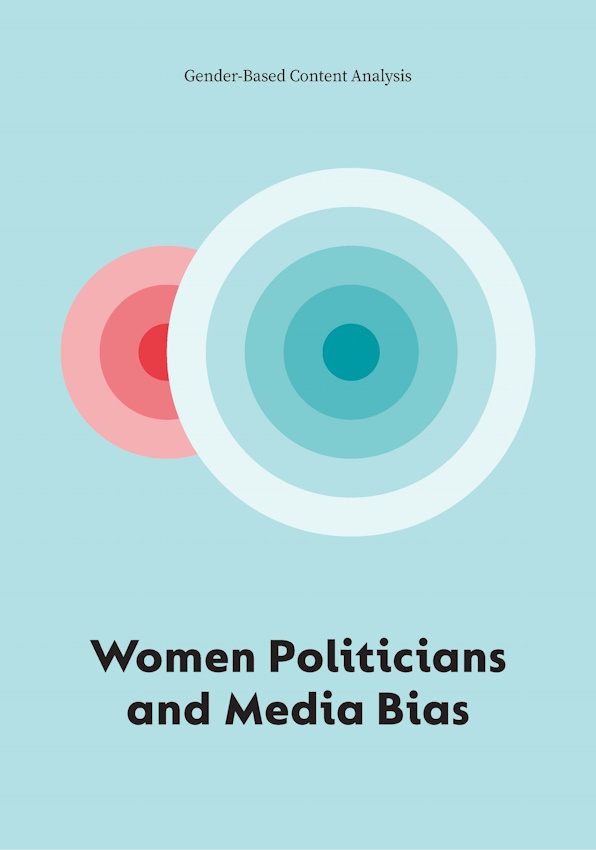 |
The gender narrative was significantly underrepresented in the news reports on the presidential and parliamentary elections due to the fact that it was seldom present in the rhetoric of the campaign speakers. The media hardly analysed any topics about the involvement of women in the elections, especially women from ethnic communities, which indicates the low level of awareness of the importance of gender equality issues. This is shown by the gender-based media content analysis “Women Politicians and Media Bias”, which the Institute of Communication Studies (ICS) prepared for the period March – May 2024, i.e. starting from the official deadline for submission of presidential candidacies to the State Election Commission of March 19, until the second round of the presidential elections on May 8, which coincided with the parliamentary elections. The research shows that the mere presence of women politicians in the media is reason enough for their stereotyping and discrimination related to traditional gender roles and the physical appearance of women, especially through the use of sensationalist language. This contributes to their further objectification and it defocuses from key political issues, reinforces attitudes about the traditional responsibilities and tasks of men and women, and perpetuates prejudice about the role of women in the public sphere. |
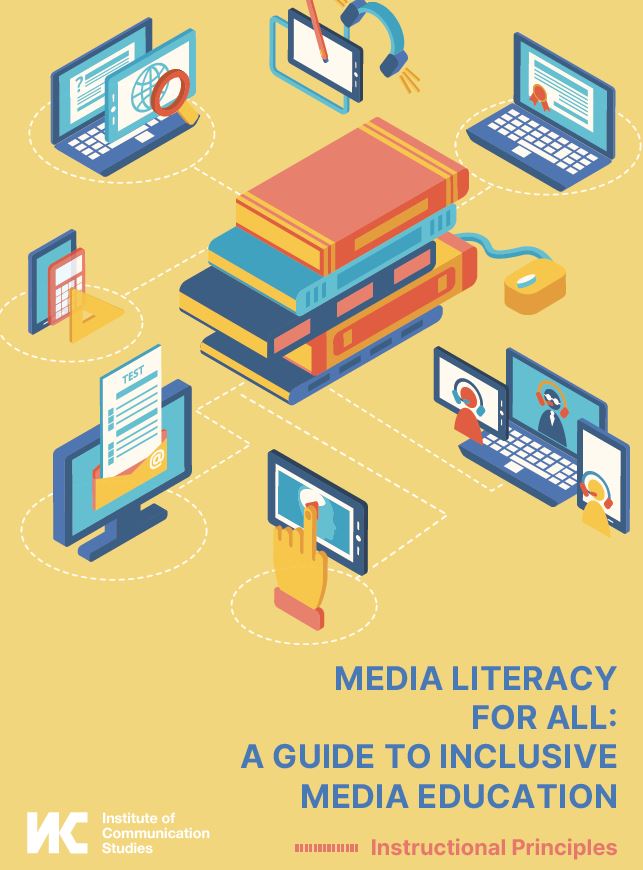 |
The “Media Literacy for All: A Guide to Inclusive Media Education” guide aims to make media lessons more inclusive and fun for everyone. It’s a resource that helps educators reflect on how they teach and try new ideas to ensure their students feel welcome and engaged. It’s packed with ideas for creating a classroom where everyone feels welcome and included, regardless of background, making every student better equipped to navigate our media-saturated world. It contains tips from picking the right materials and exercises to activities that get everyone involved in the learning process. You don’t have to be a media expert to use these tips and exercises. They’re designed for anyone who wants to support their students (whether in primary school or early high school levels) to think critically and creatively about the media they encounter daily. The document is based on the original education model designed by KAVI Finland within the project Inclusive and Creative Media Education (ICME) led by KAVI, in which ICS partners along with the University of Florence, Italy. |
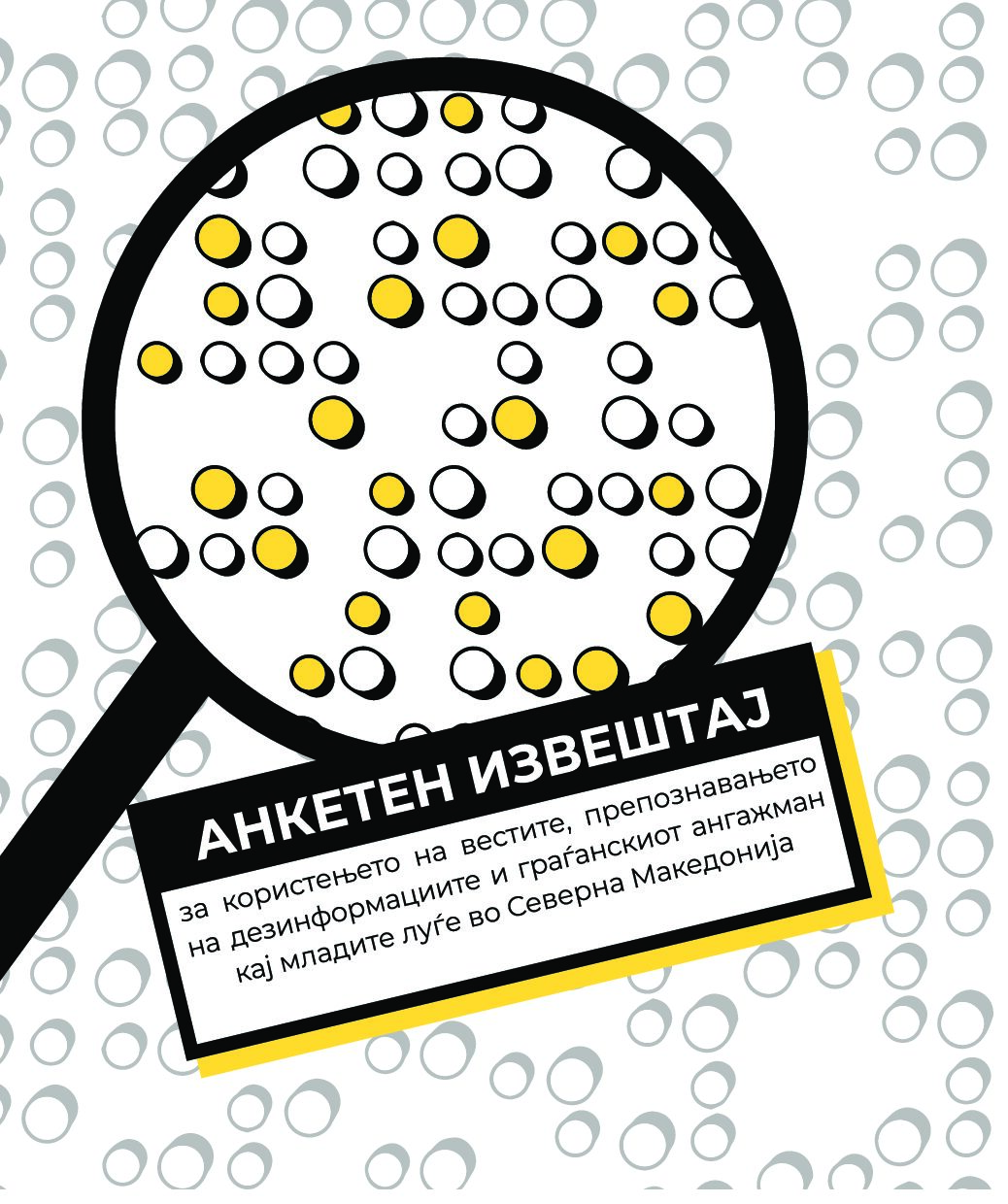 |
This is shown by the survey conducted by the Institute of Communication Studies (ICS) in the run-up to the presidential and parliamentary elections, the purpose of which is to determine the habits of media and news consumption among young people, their ability to recognize disinformation in the media and what their civic and political engagement is. |
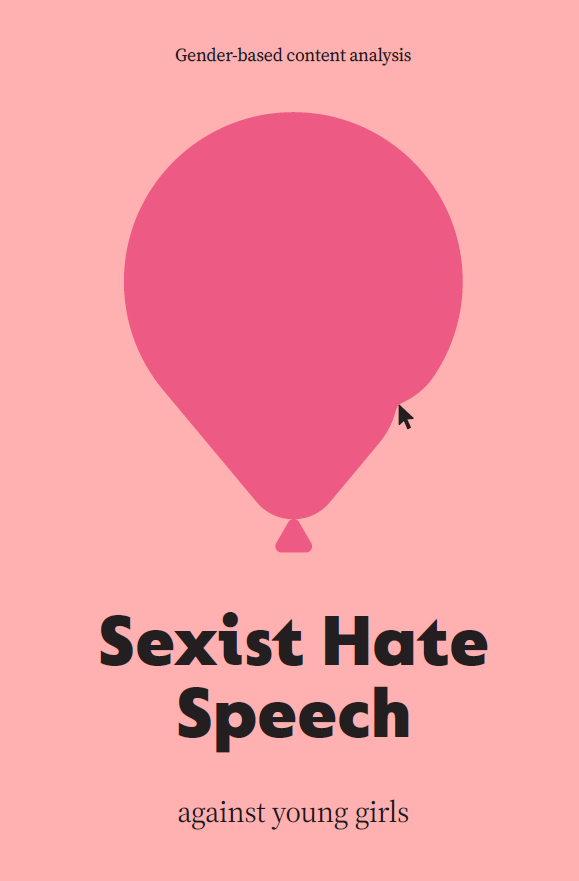 |
Sexist hate speech against young girls is spread through comments on news reports on social media, which are fertile ground for the development of gender-based malicious and disturbing content. Such content is usually created in response to the news reports, so the role of the media and their reporting is significant for their prevention, and especially the regulation of comments on news reports on social media.
This is shown by the analysis of gender-based content “Sexist hate speech against young girls“, developed by the Institute of Communication Studies.
|
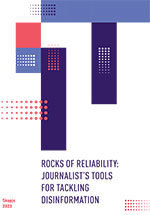 |
The guide Rocks of Reliability: Journalist’s Tools for Tackling Disinformation is intended primarily for journalists and media workers who are faced with a surge of disinformation, misinformation or malinformation, or various other manipulative techniques.
This publication contains standards and values for credible journalism, as well as free tools for checking sources and information and for publishing credible media content.
|
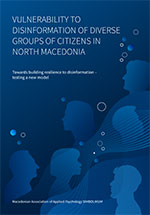 |
The research “Vulnerability to disinformation of diverse groups of citizens in North Macedonia” aims to determine the individual factors, motives, and barriers for recognizing and dealing with disinformation of vulnerable groups of citizens (young people between 18 and 28 years old, people over 60 years old, and recipients of social assistance), as well as to determine the connection of media literacy with the ability to recognize disinformation in online news. ICS produced the research within the project “Use Facts” with the support of the British Embassy in Skopje.
|
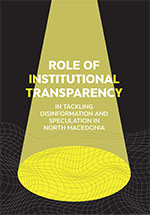 |
The study “Role of Institutional Transparency in Tackling Disinformation and Speculation in North Macedonia” aims to identify how transparency can help counter the spread of disinformation that undermines trust in state institutions. It explores how transparency contributes toward greater openness and public trust, prevents disinformation, promotes accurate and open information, and contains recommendations on strengthening the resilience of democratic societies to disinformation. The Institute of Communication Studies developed the report within the “Use Facts” project with support from the British Embassy in Skopje.
|
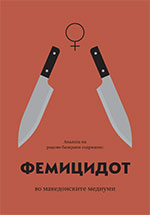 |
The main focus of this analysis is media coverage of femicides, as the most severe form of gender-based violence. The research was conducted using a qualitative analysis of news reports on cases of femicide, published in the period from September 2022 to January 2023. The initial research query the analysis aims to answer is how does media coverage of cases of femicide, as the most severe form of gender-based violence, impact the perpetuation of gender stereotypes. |
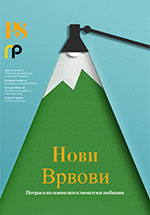 |
In the third decade of the twenty-first century, promising new climate commitments have already been made. More and more governments and large corporations are setting targets for reducing greenhouse gas emissions. But much remains to be done. The rapid spread of the Delta strain of the coronavirus and the myriad of extreme forest fires and storms around the world were a hellish harbinger of an increasingly probable future. The joint publication of Res Publica and Project Syndicate “New Summits” focuses on possible solutions with which we will be more prepared to face that future. |
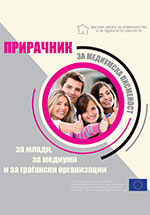 |
The School of Journalism and Public Relations and the Media Diversity Institute of London have developed a “Handbook for Media Literacy for Youth, Media and Civil Society Organizations“. It contains useful tips on how all of these groups can promote media literacy. |
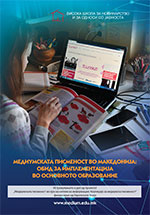 |
The School of Journalism and Public Relations, with the support of the Bureau for Development of Education, conducted the research “Media Literacy in Macedonia: Efforts for Implementation in Elementary Education“, in order to determine how this concept is treated in curricula, which forms of acquiring knowledge for media literacy are used (didactic material, equipment, space conditions, etc.) and what is the education of the teaching staff for media literacy. |
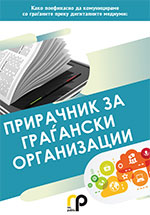 |
The manual “How to communicate more effectively with citizens through digital media: a manual for civil society organizations” provides an overview of the opportunities offered by digital media as opposed to traditional ones. It addresses how digital media can help CSOs to promote their activities, projects and initiatives. The handbook also contains practical tips for creating effective messages, segmenting the audience, and tips on which digital tools are most appropriate for certain audiences, how to most easily measure the impact of social media and how to prepare a social media plan to help them. of CSOs to get closer to their target audience. |
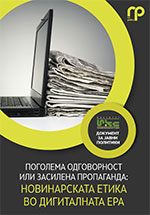 |
The policy document “Greater Responsibility or Enhanced Propaganda: Journalism Ethics in a Digital Era” focuses on the challenges and problems facing digital journalism. The document provides an overview of legislation in the field, an overview of cases from practice, and recommendations on how the media and journalists should report professionally and ethically. |
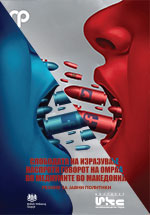 |
The document “Freedom of Expression VS Hate Speech in the Media in Macedonia” focuses on the problem of hate speech that exists in the media community in Macedonia. The document provides an overview of European and Macedonian legislation in the field, cases from practice, as well as recommendations for effective and systematic dealing with hate speech. |
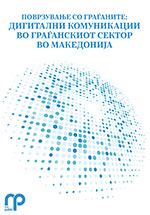 |
The analysis “Connecting Citizens: Digital Communications in the Civil Society Sector in Macedonia” addresses the benefits and the need for efficient and effective communication of civil society organizations with their target groups and the general public using modern communication tools and techniques. In addition, it explores the capacities and resources available to CSOs that address digital communications and the extent to which they use digital tools to convey their messages to the public and target groups. |
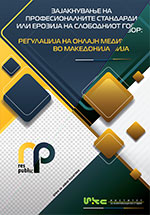 |
The document “Strengthening professional standards or free speech erosion: regulation of online media in Macedonia” addresses issues related to online media regulation and the challenges and problems arising from this process. The document analyzes domestic and European legislation in the field, and offers recommendations for improvement in the area, applicable to different stakeholders in Macedonian society. |
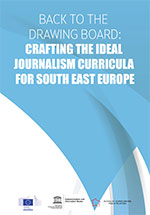 |
The analysis “Back to the Drawing Board: Crafting an ideal journalism curricula for South East Europe” aims to determine the constituent elements of the ideal South East European Journalism Curriculum (SEE), taking into account the different structural and socio-political circumstances with which facing journalistic education in this region. The aim of the research is to encourage higher education institutions to follow the recommendations included in it and to evaluate and modify their curricula in journalism by following the indicators set out in this research. Download (ENG) Download (MKD) Infographics (MKD) Infographics (ENG) |
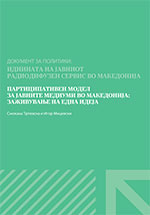 |
How can the Macedonian Radio and Television (MRT) be transformed into a modern broadcasting medium close to the citizens? To do this, a different normative model of public service is needed from that now embedded in the legislation – a participatory model of public media service. The changes that need to be made must be comprehensive – from changing the regulations, providing appropriate independent and stable sources of funding, developing a comprehensive strategy for the development of MRT and internal organizational and technological-production activities. The Public Policy Document “Participatory Model for Public Media in Macedonia: Reviving an Idea” was prepared within the project “The Prospect and Development of Public Service Media: A Comparative Study of PSB development in Western Balkans in Light of European Integration”. |
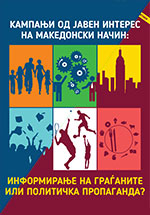 |
The analysis “Campaigns of public interest in the Macedonian way: informing the citizens or political propaganda?” aims to determine whether the public interest campaigns that were conducted in the media in Macedonia over the past few years were of public interest or served the interests of political elites or other institutions? The analysis also addresses the Macedonian legislation and whether it is respected during the implementation of these campaigns. The document includes recommendations for improvement in the area. |
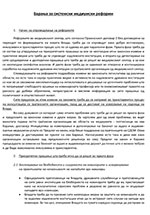 |
In anticipation of the forthcoming reforms in the media sphere arising from the Przino Agreement, a group of media organizations submitted a request to the Government to implement systemic media reforms emphasizing the priority issues that require urgent legal changes and practical measures to be implemented by competent institutions. The Government is also required to initiate an inclusive and transparent process of public debate with all stakeholders, both on priority and other issues, the resolution of which may lead to improved freedom of expression and the situation in the media sector. |
 |
The purpose of the analysis “Under the public’s eye: the right to privacy of public figures in Macedonia” is to determine whether information about public figures published in the media satisfies the so-called “Public interest test”, i.e. whether the media properly balance the right of privacy of those persons with the right of the public to “know”. The document also provides an overview and analysis of legislation in the field. |
 |
The School of Journalism and Public Relations conducted the research “Media Literacy in Macedonia: the missing link for active citizenship“. In addition to explaining the concept of “media literacy” and how it is defined in international regulation, the report analyzed the situation in this area from a local perspective, i.e. how media literacy is understood and practiced in secondary education, civil society and media in Macedonia. The research was conducted with the support of the European Union. Download (MKD) Download (Заклучоци – MKD) Download (Заклучоци – ENG) |
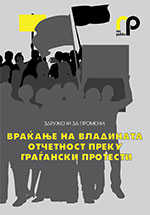 |
The aim of the research “Rallying for Change: Restoring Government Accountability through Civil Protests” is to see the communication practices of the media, activists and representatives of state institutions during some of the civil protests that took place in Macedonia in 2014 and 2015. That is, how these stakeholders communicated with their target groups, and how their activities were framed in the media. |
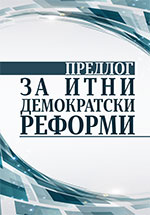 |
A group of experts and civil society organizations, including the Institute of Communication Studies, have prepared a Proposal for Urgent Democratic Reform aimed at restoring democratic standards and values in Macedonia, and restoring citizens’ trust in key state institutions. |
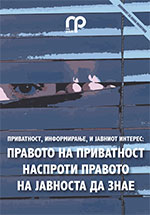 |
The purpose of this document is to analyze the balance between the right to privacy and the right to inform the public. The document addresses European and Macedonian privacy legislation, examples from the practice of media reporting in Macedonia in this regard, and offers recommendations for improving privacy and information policies. |
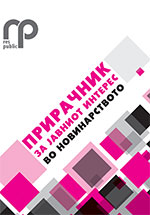 |
The Handbook of Public Interest Journalism summarizes generally accepted values, principles, standards, and practices in the journalistic profession. Based on ethical journalism codes, domestic and foreign media regulation, and work policies in the world’s most influential news outlets, the handbook provides clear criteria for determining public interest in the news. In addition to the 10 basic principles of journalism, the handbook introduces a test of public interest in journalism. |
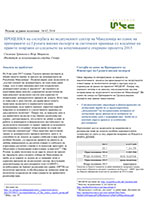 |
The Institute of Communication Studies has prepared a Policy Brief in which it assesses the situation in the media sector in Macedonia in the context of the recommendations made by the Group of Senior Experts led by Reinhard Priebe. The summary contains precise evidence whose conclusion is that Macedonia has not created the basic conditions for fair and democratic elections in April 2016. |
 |
“Media in Macedonia: Guardians of the Public or Hostages of Political Interests” analyzes the role of the media in protecting the public interest in Macedonia, and the way the Macedonian media treat the public interest in reporting. The document analyzes Macedonia’s media legislation and offers recommendations for strengthening the role of the media in protecting the public interest in Macedonia. |
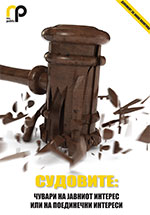 |
“Courts: guardians of the public interest or individual interests” deals with the more important issues related to the public interest in terms of enjoying the basic freedoms and rights of citizens and legal entities in Macedonia. The purpose of the document is to show the different views on the role of the courts in balancing individual freedoms and rights and the public interest. |
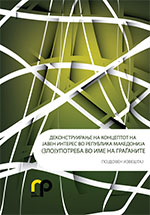 |
The baseline report “Deconstructing the concept of public interest in the Republic of Macedonia: (mis) use on behalf of citizens” provides a comprehensive overview of what constitutes public interest, and how this term is used in various legal and ethical contexts. In addition, the report identifies key stakeholders who protect the public interest in a society and identifies best practices in the field. |
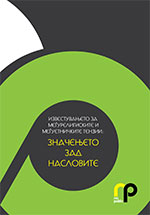 |
“Reporting on Interreligious and Interethnic Tensions: The Meaning Behind the Headlines” focuses on media coverage of issues of a multiethnic and multi-religious nature and respect for professional journalistic standards in informing the public. |
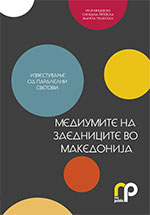 |
“Reporting from parallel worlds: the media of the communities in Macedonia” opened serious questions about the rights of ethnic communities in the media sphere in Macedonia, the regulatory policy in this area and the challenges posed to the journalistic professional community. |
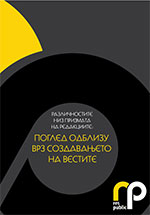 |
“Diversity through the prism of newsrooms: An insight into the news production process” shows the situation in newsrooms and the views and perceptions of editors, journalists and some media owners on topics related to reporting on diversity. |
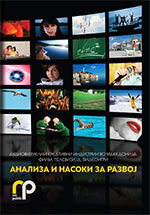 |
This publication encompasses the most significant documents that emerged from the project “Measuring the economic contribution of audiovisual industries in Macedonia“. The guidelines for the development of the audiovisual industries contain the ideas and measures proposed by the representatives of this sector during numerous discussions and meetings, as well as the Operational Plan for their realization. |

